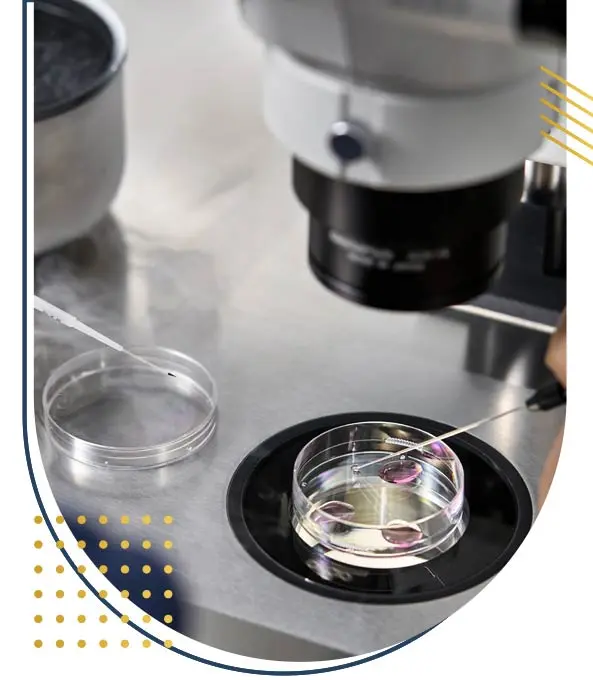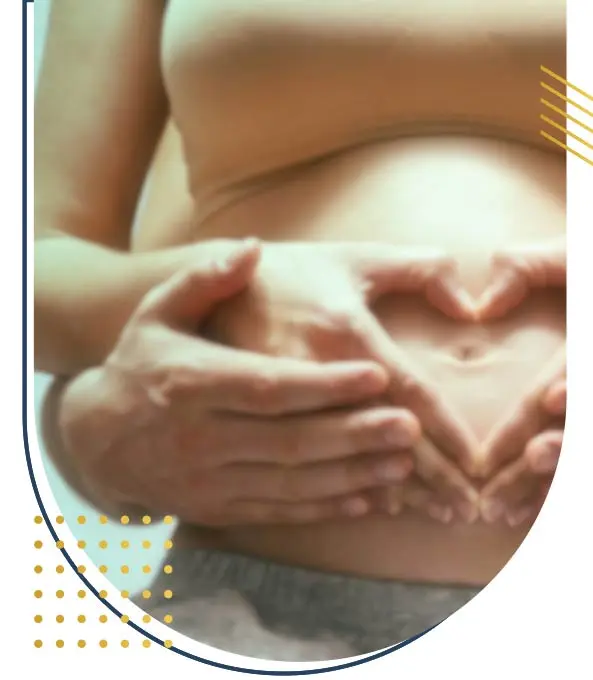
In vitro fertilization (IVF) in Egypt consists of reproducing the fertilization of an egg by a spermatozoon outside the woman's body to obtain an embryo which will be transferred to the uterus, it is realized in a laboratory in the case this can not occur naturally.
Thanks to this technique, many infertile couples become parents.
In vitro fertilization price in Egypt
The price IVF Egypt is advantageous, so ask for a free online quote in order to obtain the cost in vitro fertilization Egypt, you can also contact us by phone and one of our counselors will give you more details about IVF Egypt.
What are the types of the In vitro fertilization ?
Conventional IVF (In Vitro Fertilization) :
In the realm of assisted reproductive technology (ART), Conventional IVF stands as the foundational pillar upon which modern infertility treatments have been built.
This technique involves the retrieval of mature eggs from a woman's ovaries and the fertilization of these eggs with sperm in a laboratory setting.
Typically, the mature eggs are collected through a minor surgical procedure known as follicular aspiration, which is performed under sedation. Following this, the retrieved eggs are placed in a culture dish alongside a concentrated sample of sperm, where fertilization occurs spontaneously.
Once fertilization is confirmed, the resulting embryos are cultured in a controlled environment for several days until they reach a suitable stage for transfer into the woman's uterus, typically at the blastocyst stage.
Conventional IVF has revolutionized the treatment of infertility worldwide, offering hope to countless individuals and couples struggling to conceive.

Intracytoplasmic Sperm Injection (ICSI):
In the intricate tapestry of assisted reproduction, Intracytoplasmic Sperm Injection (ICSI) emerges as a remarkable innovation, particularly beneficial in cases of male factor infertility or previous failed fertilization attempts with conventional IVF.
Unlike conventional IVF, where fertilization occurs through the natural interplay of sperm and egg, ICSI involves the direct injection of a single sperm cell into the cytoplasm of an egg using a micromanipulation technique. This meticulous procedure requires highly skilled embryologists and specialized equipment to ensure precision and optimal outcomes.
By circumventing barriers to fertilization, such as poor sperm motility or abnormal morphology, ICSI has enabled countless individuals and couples to realize their dreams of parenthood. Moreover, ICSI has widened the scope of fertility treatments by offering viable options to individuals with severe male factor infertility, thereby underscoring its indispensable role in the field of assisted reproduction.
Preimplantation Genetic Testing (PGT) :
Within the intricate web of assisted reproductive technologies, Preimplantation Genetic Testing (PGT) emerges as a transformative tool, offering valuable insights into the genetic health of embryos prior to implantation.
PGT encompasses two distinct modalities: PGT-A (aneuploidy screening) and PGT-M (monogenic/single-gene disorder testing), each serving a unique purpose in the quest for healthy offspring.
PGT-A involves the comprehensive analysis of embryo chromosomes to identify numerical abnormalities, such as aneuploidy, which may compromise embryo viability and increase the risk of miscarriage or genetic disorders.
Conversely, PGT-M is tailored for individuals at risk of transmitting specific genetic conditions to their offspring, allowing for the identification and selection of embryos free from inherited genetic mutations.
By empowering prospective parents with knowledge and choices, PGT has revolutionized the landscape of assisted reproduction, heralding a new era of personalized medicine and improved pregnancy outcomes.
Gamete Intrafallopian Transfer (GIFT) :
Amidst the diverse array of assisted reproductive techniques, Gamete Intrafallopian Transfer (GIFT) occupies a distinctive niche, offering a unique approach to fertilization and embryo development. Unlike traditional IVF, which involves fertilization in a laboratory setting, GIFT entails the direct transfer of both sperm and eggs into the fallopian tubes, where fertilization occurs within the woman's body.
This approach capitalizes on the natural environment of the fallopian tubes, fostering the interaction between sperm and egg in a manner akin to natural conception. The procedure begins with the retrieval of eggs from the woman's ovaries through follicular aspiration, followed by the collection of sperm from a male partner or donor.
These gametes are then carefully introduced into the fallopian tubes using a specialized catheter under ultrasound guidance, facilitating fertilization within the physiological milieu of the female reproductive tract. By harnessing the inherent mechanisms of fertilization, GIFT offers a holistic approach to assisted reproduction, emphasizing the importance of natural processes in the quest for conception.
Intrauterine Insemination (IUI) :
Within the spectrum of assisted reproductive techniques, Intrauterine Insemination (IUI) emerges as a versatile and accessible option for couples facing various infertility challenges.
Unlike more invasive procedures such as IVF, IUI involves the direct introduction of washed and concentrated sperm into the woman's uterus, bypassing potential barriers to conception and enhancing the chances of fertilization. The procedure begins with the stimulation of ovulation through hormonal medications, followed by the collection, processing, and preparation of sperm from either a male partner or a donor.
The prepared sperm sample is then carefully deposited into the uterine cavity through a thin catheter, timed to coincide with ovulation for optimal results. By delivering sperm directly to the site of fertilization, IUI maximizes the likelihood of successful conception while minimizing potential obstacles such as cervical mucus abnormalities or sperm motility issues.
Additionally, IUI offers a less invasive and more cost-effective alternative to more complex fertility treatments, making it an attractive option for couples seeking to build their families.
Assisted Hatching :
In the intricate tapestry of assisted reproduction, Assisted Hatching emerges as a delicate yet impactful technique, offering a means to enhance embryo implantation and improve the likelihood of successful pregnancy.
This specialized procedure is particularly beneficial for individuals or couples with a history of failed implantation or advanced maternal age, where the outer shell of the embryo, known as the zona pellucida, may pose a barrier to hatching and subsequent implantation.
Assisted Hatching involves the precise manipulation of the zona pellucida using chemical, mechanical, or laser-assisted techniques, creating a small opening through which the developing embryo can emerge during the implantation process.
By facilitating embryo hatching, this technique promotes the establishment of a secure connection between the embryo and the uterine lining, thereby optimizing the chances of successful implantation and subsequent pregnancy.
Assisted Hatching exemplifies the delicate balance between innovation and precision in the realm of assisted reproduction, offering hope and opportunity to individuals and couples embarking on the journey towards parenthood.
In vitro fertilization Egypt :for whom ?
In vitro fertilization Egypt is peformed in the following cases :
- Absent or blocked tubes
- Male infertility (low sperm motility or low sperm count) that could not be treated.
- Endometriosis
- Unexplained infertility
- Ovarian malfunction requiring egg donation.
In vitro fertilization can also be performed for couples with a genetic abnormality that could lead to a serious disease in order to be able to choose an embryo that is not affected.
How to prepare for an In vitro fertilization procedure ?
Initial Consultation and Assessment :
The journey toward IVF begins with an initial consultation with a fertility specialist. This meeting involves discussing medical history, reproductive goals, and treatment options.
A thorough assessment, including a review of medical records and diagnostic tests, helps identify underlying fertility issues. This consultation fosters open communication and sets the stage for a collaborative partnership between patients and healthcare providers.
Ovarian Reserve Testing :
Assessing ovarian reserve is crucial for IVF planning. Tests such as blood hormone levels (FSH, LH, estradiol, AMH) and transvaginal ultrasound (AFC) gauge ovarian follicle quantity and quality.
This information guides ovarian stimulation protocols, helping to optimize treatment outcomes and minimize risks such as ovarian hyperstimulation syndrome (OHSS).
Hormonal Stimulation Protocol :
Ovarian stimulation involves administering GnRH agonists/antagonists to suppress natural ovulation and exogenous gonadotropins (FSH, LH analogs) to stimulate multiple follicles. Monitoring through ultrasound scans and hormone assays ensures personalized dosing, aiming to maximize egg yield while maintaining safety.
Sperm Collection and Preparation :
Sperm collection involves obtaining samples from the male partner through masturbation or surgical techniques like TESE or TESA.
Donor sperm may be an option in certain cases. The collected sperm undergoes processing to isolate motile and morphologically normal sperm for IVF fertilization, ensuring optimal quality and concentration.
Psychological and Emotional Support :
Fertility clinics provide psychological support services to address the emotional toll of infertility and IVF treatment. Counseling, support groups, and educational resources help patients cope with stress and uncertainty, fostering resilience and empowerment throughout the fertility journey.
Lifestyle Modifications and Preconception Care :
Lifestyle adjustments, including a balanced diet, regular exercise, and avoiding harmful substances, optimize chances of IVF success. Prenatal vitamins with folic acid supplementation, stress management techniques, and preconception care promote overall well-being and prepare individuals for pregnancy.
Genetic Counseling and Testing :
Genetic counseling may be recommended to assess the risk of hereditary conditions and discuss options like preimplantation genetic testing (PGT) for embryo selection. Screening for infectious diseases ensures the safety of IVF procedures and future pregnancies.
Financial Planning and Insurance Coverage :
IVF treatment can be costly, so understanding financial aspects and insurance coverage is essential. Fertility clinics often provide financial counseling and assistance programs to help alleviate financial burdens and ensure access to care.
Legal Considerations and Consent Forms :
Legal issues, such as consent for embryo disposition and parental rights, are addressed through detailed consent forms and discussions with legal professionals. Clear communication and documentation ensure compliance with legal requirements and protect the rights of all parties involved.
Medication Administration Training :
Patients receive training on administering fertility medications, including injections, to ensure proper dosage and timing. This education empowers patients to actively participate in their treatment and promotes adherence to medication protocols.
Preoperative Instructions and Preparation :
Before egg retrieval or embryo transfer procedures, patients receive preoperative instructions and prepare for anesthesia administration. This includes fasting guidelines, medication adjustments, and arranging transportation for the procedure day.
Follow-up Appointments and Monitoring :
Regular follow-up appointments and monitoring throughout the IVF cycle allow healthcare providers to assess response to treatment, adjust protocols as needed, and provide ongoing support and guidance to patients.
IVF Egypt :how is it performed ?
Ovarian Stimulation :
The process of in vitro fertilization Egypt must follow several steps.
First, ovarian stimulation is performed.
Ovarian stimulation treatments are used to stimulate ovulation in order to obtain sufficient maturation of several follicles in the ovaries and then to retrieve several mature oocytes to allow their fertilization. Hormonal blood tests are performed every day in the same reference laboratory to assess the quality of hormonal secretion of the follicles.
Ultrasound is used to monitor response to treatment and follicular growth.
Maturation of the follicles :
The second step is the triggering of stimulation. This is done when the number and size of follicles are satisfactory and the hormone levels are sufficient. An injection of HCG hormone is then realized 34 to 36 hours before the oocyte puncture. The doctor locates the mature follicles during the ultrasound and sucks out their contents through a needle placed in the vagina in the direction of the ovaries.
Puncture of the follicles and collection of the sperm :
The third step is the puncture of the follicles. This is done during a few hours of hospitalization under local or general anaesthesia. The follicles are then stored in a culture medium.
5 to 10 oocytes are collected and stored in an incubator at 37 degrees. The spouse's sperm is collected on the day of the follicle puncture. It is also possible to use the spouse's previously frozen sperm or donor sperm.
Fertilization of sperm and egg :
Finally, the fourth step is in vitro fertilization. The sperm is processed to collect the most fertile sperm. The oocytes and sperm are placed in a culture medium favorable to their survival and deposited in the incubator at 37 degrees.
Transfer to the uterus :
Two to six days after incubation, the fertilized egg becomes an embryo that can be transferred into the uterus. Several embryos are obtained. The number of embryos transferred depends on the age of the woman and the management strategies of MAP.
After in vitro fertilization Egypt
After in vitro fertilization in Egypt, the patient have to rest the first hours and then resume her daily activities while keeping away from stress and avoiding strenuous activities that can cause bleeding.
The patient should also avoid smoking, drinking alcohol and carrying heavy loads.
After two weeks, she can do a pregnancy test, if it is negative, the couple can start the procedure again after about six months, but, this waiting period depends on the age of the patient.
Regular visits to the gynaecologist are necessary for check ups while following all his recommendations for the success of this technique.
IVF Egypt results
The results of in vitro fertilization Egypt are generally effective, it also depends on the health and age of each patient as some factors play an important role in this procedure among them :
- Cause of infertility for example women who suffer from endometriosis are less likely to get pregnant.
- -Lifestyle factors : smoking, excessive caffeine, obesity…decrease the chances of getting pregnant through IVF
- The age : the younger your are, the more chances you have to get pregnant.
What are the risks of the In Vitro Fertilization ?
Ovarian Hyperstimulation Syndrome (OHSS):
Ovarian hyperstimulation syndrome is a complication that can occur when the ovaries are excessively stimulated by fertility medications used during IVF.
This can lead to the rapid enlargement of the ovaries, fluid accumulation in the abdomen and chest, and in severe cases, kidney failure and blood clotting disorders.
OHSS can be mild, moderate, or severe, and close monitoring by healthcare providers is essential to minimize the risk and manage symptoms effectively.
Multiple Pregnancy :
IVF increases the risk of multiple pregnancy, particularly with the transfer of more than one embryo into the uterus to enhance the chances of success.
Multiple pregnancies, such as twins or triplets, carry higher risks of complications for both the mother and babies, including preterm birth, low birth weight, and pregnancy-related complications such as preeclampsia and gestational diabetes.
Healthcare providers may recommend strategies to reduce the risk of multiple pregnancy, such as elective single embryo transfer (eSET), depending on individual circumstances and preferences.
Ectopic Pregnancy :
An ectopic pregnancy occurs when a fertilized egg implants outside the uterus, most commonly in the fallopian tubes.
IVF slightly increases the risk of ectopic pregnancy compared to natural conception, particularly in women with a history of tubal damage or pelvic inflammatory disease.
Ectopic pregnancy can be life-threatening if not diagnosed and treated promptly, requiring medical intervention such as medication or surgery to remove the ectopic pregnancy.
Ovarian Torsion :
Ovarian torsion is a rare but serious complication that can occur when the ovary twists around its blood supply, leading to reduced blood flow and potential tissue damage. Ovarian stimulation during IVF can increase the risk of ovarian enlargement and torsion, especially in women with polycystic ovary syndrome (PCOS) or a history of ovarian cysts. Symptoms of ovarian torsion include sudden and severe pelvic pain, nausea, and vomiting, requiring immediate medical attention.
Emotional and Psychological Stress :
IVF treatment can be emotionally and psychologically challenging for individuals and couples, particularly due to the uncertainty of outcomes, financial burdens, and the physical demands of treatment. The emotional rollercoaster of hope, disappointment, and anxiety can take a toll on mental well-being and strain relationships.
Counseling, support groups, and other psychosocial interventions can help individuals cope with the stress of IVF and navigate the emotional aspects of infertility treatment effectively.

Birth Defects :
Although the overall risk of birth defects in IVF-conceived pregnancies is relatively low, some studies suggest a slightly higher incidence compared to natural conception.
Factors such as maternal age, underlying infertility causes, and the use of certain fertility treatments may contribute to this increased risk.
However, it's essential to note that the absolute risk of birth defects remains small, and the vast majority of IVF-conceived babies are born healthy.
Miscarriage :
Despite successful implantation and pregnancy following IVF, there is still a risk of miscarriage, particularly in the first trimester.
Miscarriage rates may vary depending on various factors, including maternal age, embryo quality, and underlying health conditions. Experiencing a miscarriage can be emotionally devastating for individuals and couples undergoing IVF, highlighting the importance of emotional support and counseling during the fertility journey.

